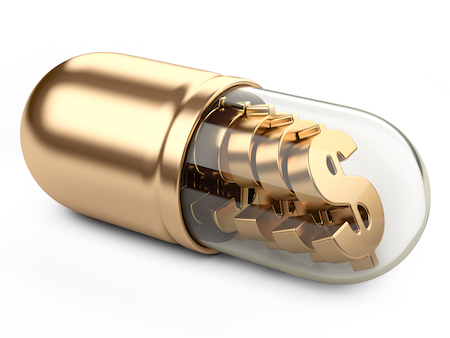
Rx Drug Price Reform Is Not A Question Of Price Vs. Innovation, But One Of Public Vs. Private Innovation
Last week, Sarah Kliff wrote an interesting piece about why prescription drug prices in America are so high compared to other industrialized countries. The international comparisons aren't new, but the conclusion that Americans have to choose between high drug prices and innovation is interesting. In a nutshell, Sarah reports that America subsidizes the world's prescription drug costs to incentivize investment in drug innovation by pharmaceutical companies and financial investors.
Sarah's article was a timely piece because also last week, the U.S. Congress passed the 21st Century Cures Act. This Act's been in the making for about two years and is the largest health care reform Act since Obamacare. It is nearly 1,000 pages, with a price tag of over $6 billion. And guess what, it includes lots of stuff about health care innovation as well as reducing approval standards for Big Pharma to bring their drugs to market. And just yesterday, the Senate, with a vote of 85-13, ended debate on the bill.
You can read the entire act here (it's at least worth a quick review).
Most of the Act's provisions, which President Obama will sign in the next few days, are uncontroversial and good. The Act provides more money for drug therapy and cancer research, mental health research and care, state opioid abuse programs and more. But not everyone's happy with the Act, including prominent Democratic Senators, Elizabeth Warren and Bernie Sanders. Both see this bill as a handout to pharmaceutical companies because of the provisions that may allow them to bring products to the market quicker than they can currently and with less attention to drug safety and efficacy.
But even Senators like Al Franken who approved the bill, lament that it does nothing to address high prescription drug prices. And the total elimination of anything to address prescription drug prices in such a relevant and related piece of legislation is more disheartening than Sarah Kliff's high cost or innovation conclusion.
The 21st Century Cures Act could easily have been, The Pharmaceutical Innovation And Price Reduction Act. Continue Reading...
EpiPen--Price Gouging Made Easy
Fortunately, I do not need an EpiPen. However, I live with someone who does. Less than 10 years ago he paid about $25 for one EpiPen; Today, he pays $250. Also, he’s forced to purchase two EpiPens at a time because of new FDA guidelines and subsequent changes by the drug manufacturer. That doubles the price to $500.
So why is the price of the EpiPen increasing when a vial of hormone epinephrine cost just $1? Political connections and sophisticated, target marketing.
Bloomberg has an excellent article on how Mylan Pharmaceuticals purchased EpiPen when it was bringing in about $200 million a year, The CEO of Mylan, Heather Bresch (formerly, Heather Manchin), is a U.S. Senator’s daughter. Through lobbying of the federal government (my assessment, not Bloomberg’s) and extensive marketing by outside experts, she and Mylan turned EpiPen into a $1 billion a year product. A look at Bresch’s profile on the Mylan website basically confirms that more EpiPen price increases are in the future as Mylan aims to reach its 2012-2018 earnings goals. And then there’s this...
A Little More About Heather Bresch
Bresch claimed she had an MBA degree she did not have and used her connections and influence to perpetuate this falsehood. She later backed away from the claim but only after a drawn out, public scandal. This is relevant to the story of how the price of this drug increased so rapidly in the hands of someone with political connections and is not afraid to use them. Heather Bresch is politically brilliant and she knows as much about pharmaceutical laws, regulations and guidelines as anyone (mostly because she studies these laws, has access to the people who write them and helps draft some herself).
The point – Heather Bresch heading Mylan Pharmaceutical Company is like placing a pharmaceutical lobbyist at the head of a pharmaceutical company. Knowledgeable—check. Connected—check. Price gouging protector—check. Continue Reading...
High Prescription Drug Usage Is As Bad As High Prescription Drug Costs
According to the headlines in the mainstream media and health news sites pharmaceutical companies are in the hot seat.
- The American Medical Association is lobbying against drug ads
- Health insurers are upping premiums because of the cost of new, high price drugs
- Medicare Part D premiums and deductibles are increasing by double digits
- The majority of Americans support prescription drug price controls
However, recently, she had a serious medical episode that resulted in a trip to the emergency room and a hospital stay. The emergency room doctor told her that the episode was related to the many prescriptions she was taking--three different ones for cholesterol alone. The worst part is that all of the doctors she sees regularly and have prescribed her medication are aware of all of the other medications she takes. Not one of them ever expressed a concern or advised her that taking so many prescriptions could have serious complications and side effects. Continue Reading...


 Denise Perkins
Denise Perkins




